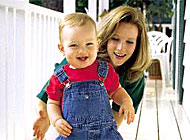Rightwing targets maternity benefits

Statutory paid maternity leave for working mothers has moved a step closer to reality in Switzerland, the only country in western Europe without such benefits.
However, the rightwing People’s Party is threatening to derail plans to grant mothers 14 weeks’ paid leave by putting the issue to a national vote.
The Swiss Senate on Thursday followed the House of Representatives in approving the law, which would give mothers access to 80 per cent of their former salary.
A maximum of SFr172 ($131) per day would be paid out, with total costs expected to run to SFr483 million a year.
It has taken four years for parliament to come up with a new legal framework for maternity benefits.
In 1999, a federal law was rejected in a nationwide vote, the third time in 15 years that the Swiss turned down paid maternity leave.
Although the concept of maternity benefits was enshrined in the constitution 60 years ago, it has until now been up to individual employers to choose whether to pay them.
Referendum threat
The People’s Party, which has been opposed to the idea of statutory paid maternity leave in the past and fought the latest proposals in parliament, said it could launch a campaign for a referendum on the new law by the end of the month.
The party says the tough economic climate means existing social benefits should be reinforced, rather than new ones created.
Under the proposals, workers and employers would both contribute to a special fund, which already covers the loss of salary incurred by people serving in the army.
Some employers have also expressed their doubts about the new scheme. Hans Rudolf Schuppisser, deputy director of the Swiss Employers’ Association, says businesses could suffer from the added costs.
“Parliament has decided to introduce a new social benefit in difficult economic times, and not everybody can adapt their cost structure at this time,” he told swissinfo.
Bare minimum
One of Switzerland’s biggest unions, Travail.Suisse, has welcomed the government’s decision, but says it represents the bare minimum.
“We would have preferred 16 weeks leave on full pay,” union spokeswoman Anna Christen told swissinfo. “But we’re happy with anything we get.”
Christen points out that even under the new law, due to be introduced in 2004 at the earliest, Switzerland will still be lagging behind other European countries.
Norwegian mothers, who are the best off, receive 100 per cent of their salary for 18 weeks, according to the International Labour Organization.
In Switzerland, just one canton, Geneva, offers maternity benefits, with working mothers receiving up to 16 weeks paid leave.
Selfishness
According to Christen, Swiss voters rejected earlier maternity legislation because of the costs involved.
“Finance has always been an issue when discussing maternity leave,” she said.
Christen adds that a certain selfishness has also played a role in past votes.
“Surveys have shown that mothers over the age of 40 tend to vote against maternity benefits because they never received them.”
The Senate also extended benefits to mothers who adopt children under the age of four, giving them four weeks paid leave. To receive benefits, mothers will have to have worked at least five months.
swissinfo, Scott Capper and Billi Bierling
Under the proposals, working mothers would get 14 weeks’ paid maternity leave at 80 per cent of their salary, or a maximum of SFr172 per day.
Total costs are expected to run to SFr483 million per year.
The money would come from a special income loss scheme funded by workers and employers, which already cover loss of income for people serving in the army.
The legislation is due to come into effect in 2004.

In compliance with the JTI standards
More: SWI swissinfo.ch certified by the Journalism Trust Initiative



You can find an overview of ongoing debates with our journalists here. Please join us!
If you want to start a conversation about a topic raised in this article or want to report factual errors, email us at english@swissinfo.ch.